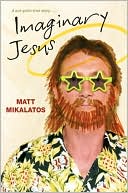What, pray tell, is Imaginary Jesus?
First of all, you’ll have to check out my introductory post from yesterday. It is considered a novel by its publisher. It has a memoir-feel about it, if a memoir can have time travel and a talking donkey, along with a huge supporting cast of fake Jesuses.
I wonder a little bit how the Christian Sci-fi and Fantasy blog tour came to review it. It counts as “speculative” due to the bizarre unusual premise and the time travel aspect, I suppose. Suffice to say, it isn’t our usual fare of swords, magic, or space travel.
First, the writing. It is hard to discuss characters, as the main character is the author, Matt Mikalatos, and a plethora of Jesuses. Not your traditional novel in this aspect (I sense a theme here…). The writing is funny, quick to read, and generally quite clever. There is a patch toward the end that just gets frentic and confusing, but overall this book moves fast and fun. Again, it is a very non-traditional novel, but you can’t call it “creative non-fiction” either.
So, what about the message/theme/theology of a book that starts off with “Jesus” getting punched in the face? The whole premise is that Matt is confronted with the idea that the construct he believes is Jesus is an imaginary Jesus. This Jesus is a mash-up of ideas that makes Matt confortable. He feels chastened mildly by his Jesus, but usually this construct keeps him happy enough.
Matt has a visit by the apostle Peter who exposes this fraud, and the two chase off after the runaway Jesus. Matt is forced to confront this imaingary Jesus before he can meet the real Jesus. He takes a trip to the first century and gets a glipse of the Rabbi from Galilee. He then returns to modern day Portland, where he encounters many fake Jesuses (very creative here: Perpetually Angry Jesus, Testosterone Jesus [the Jesus of men’s retreats], and New Age Jesus are among the copies).
Finally, after confronting some tragedy in his own past, Matt pushes through all the distractions and cultural assumptions and meets the Master.
If one is to read this book, you have to realize that it is full of whimsy and satire. As someone else said in the tour, Matt never makes fun of Jesus – he is always highly respectful of the true Jesus. It distinguishes from the other Jesuses running around. It may be a little disconcerting seeing how he plays off of modern American church culture to construct these fakes, but if the reader keeps his eyes open, they should see the critique is on us Christians and how we all can create our own ideas of Jesus.
One could say it is the fun (and more theologically correct) version of The Shack. Sometimes the humor is thick enough to be distracting, but overall the message is potent. Is such humor appropriate to communicate a serious message? Mike Duran discussed this idea this week. I think the humor disarms us to allow the message to get past our defenses.
Final impressions: this is a book that takes chances. Hard to consider it a novel, but it doesn’t really fit anything else. It is an entertaining, quick read, especially if one has a sense of humor. There are some good challenges to how comfortable we get with our own Imaginary Jesuses, rather than fully seeking the Holy One of Israel, the King of Kings. George Barna even gets in on the action, having an appearance in the book and discussing our American habit of redefining Jesus.
Don’t let the back copy or cover scare you off. If you want a challenge to look at Jesus clearly, this book has a humorous poke at our sacred cows. And if you want other opinions from the CSFF crew, Becky Miller always keeps a running tab.
Special thanks to Tyndale House Publishers for supplying me with a review copy of Imaginary Jesus.
—

Great review, Jason. I like hearing what guys thought because it seems to me guys (probably since Matt is one himself 😉 received the brunt of the humor.
Becky